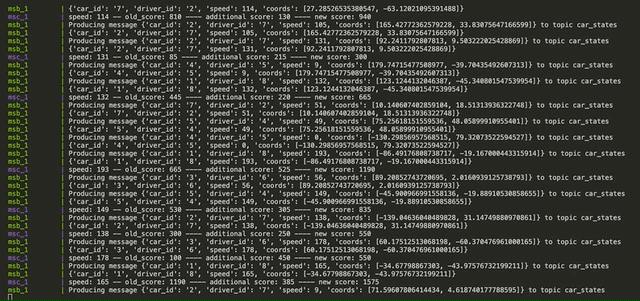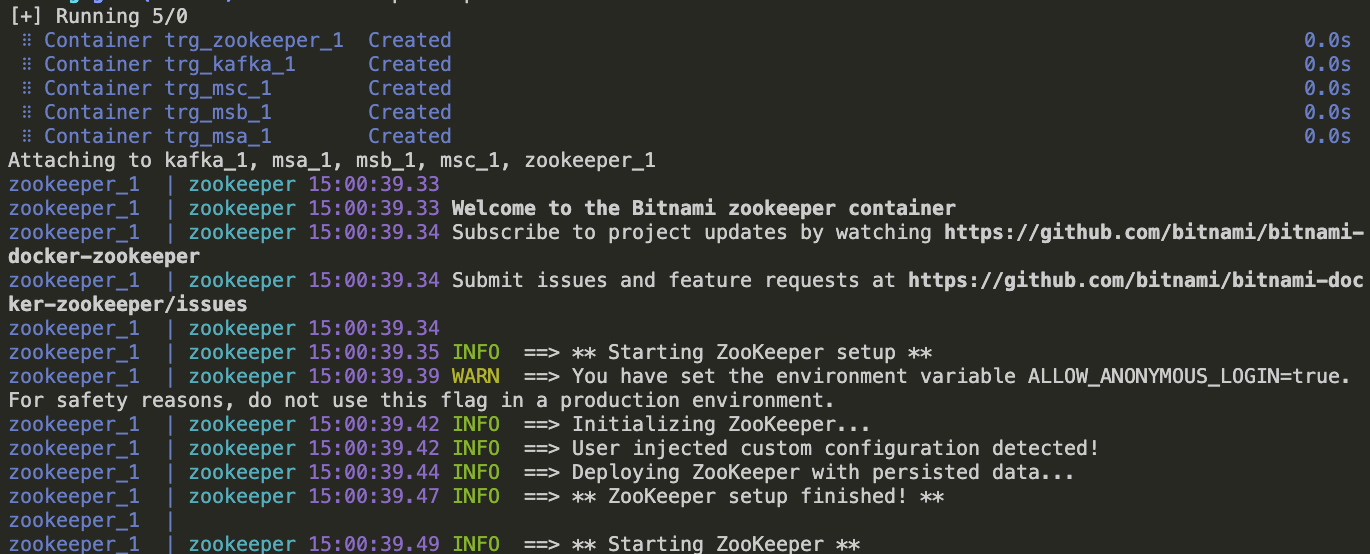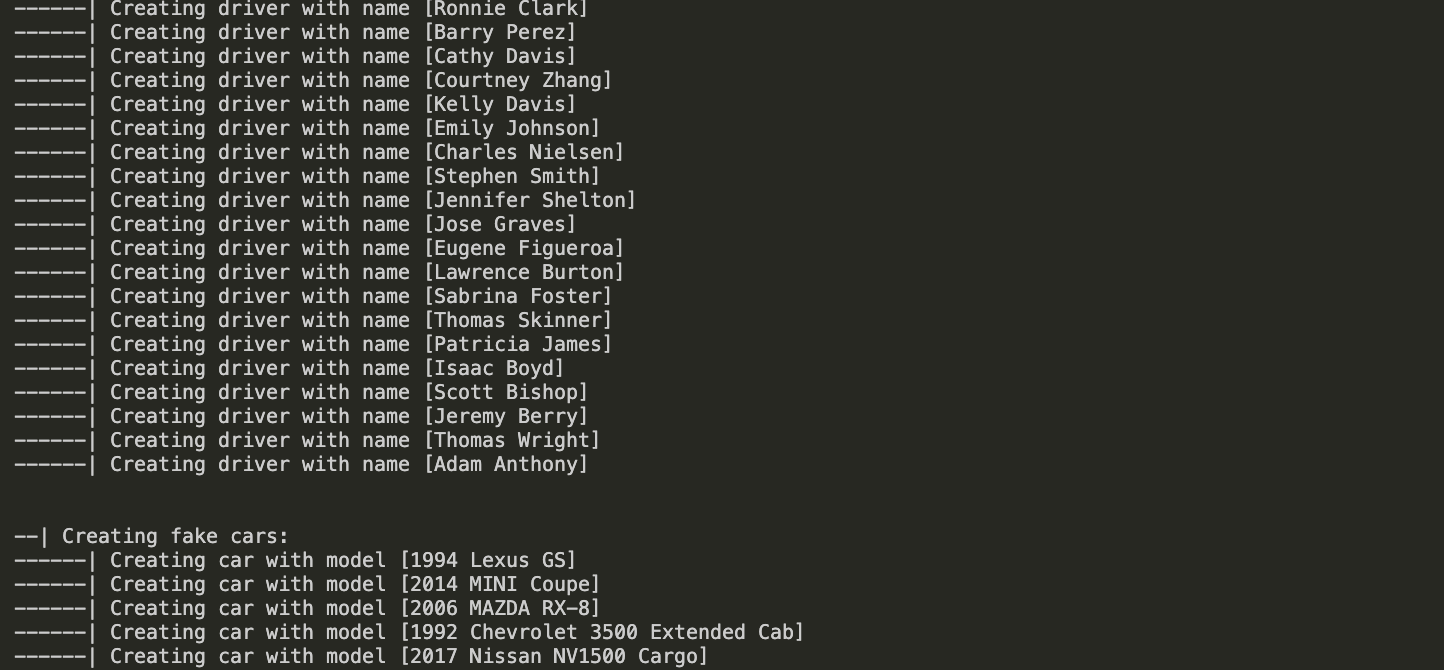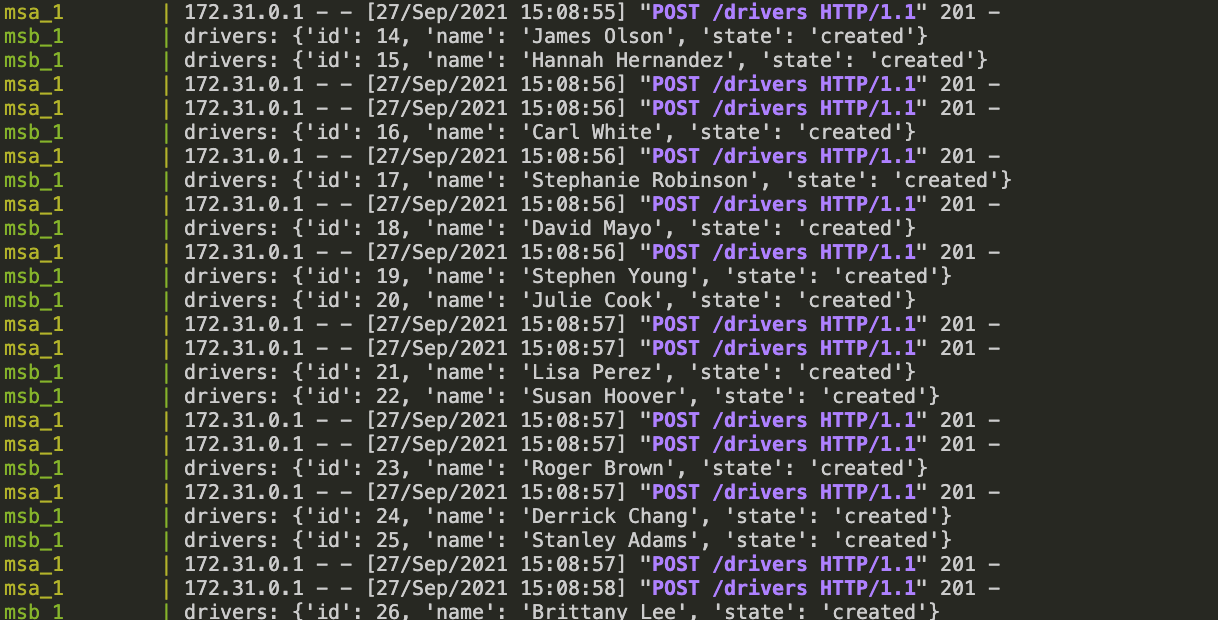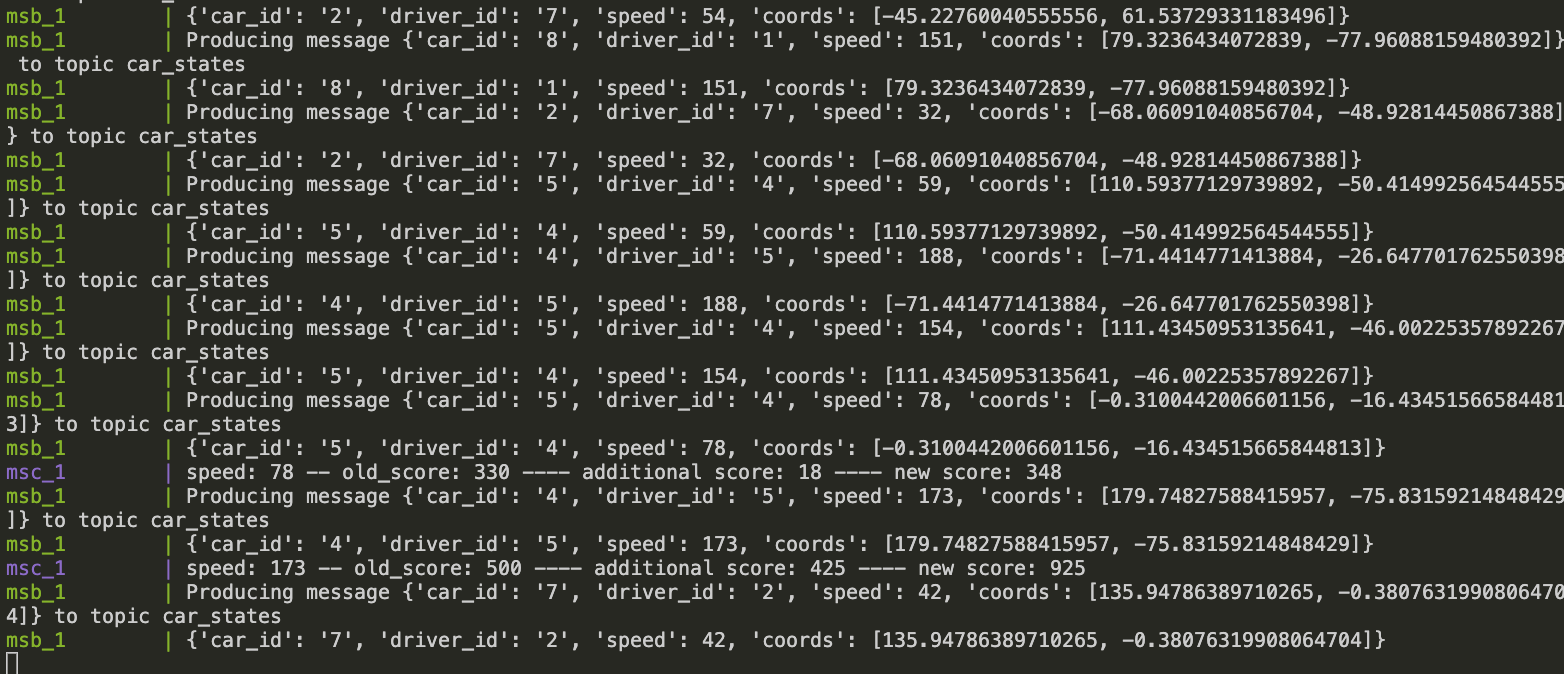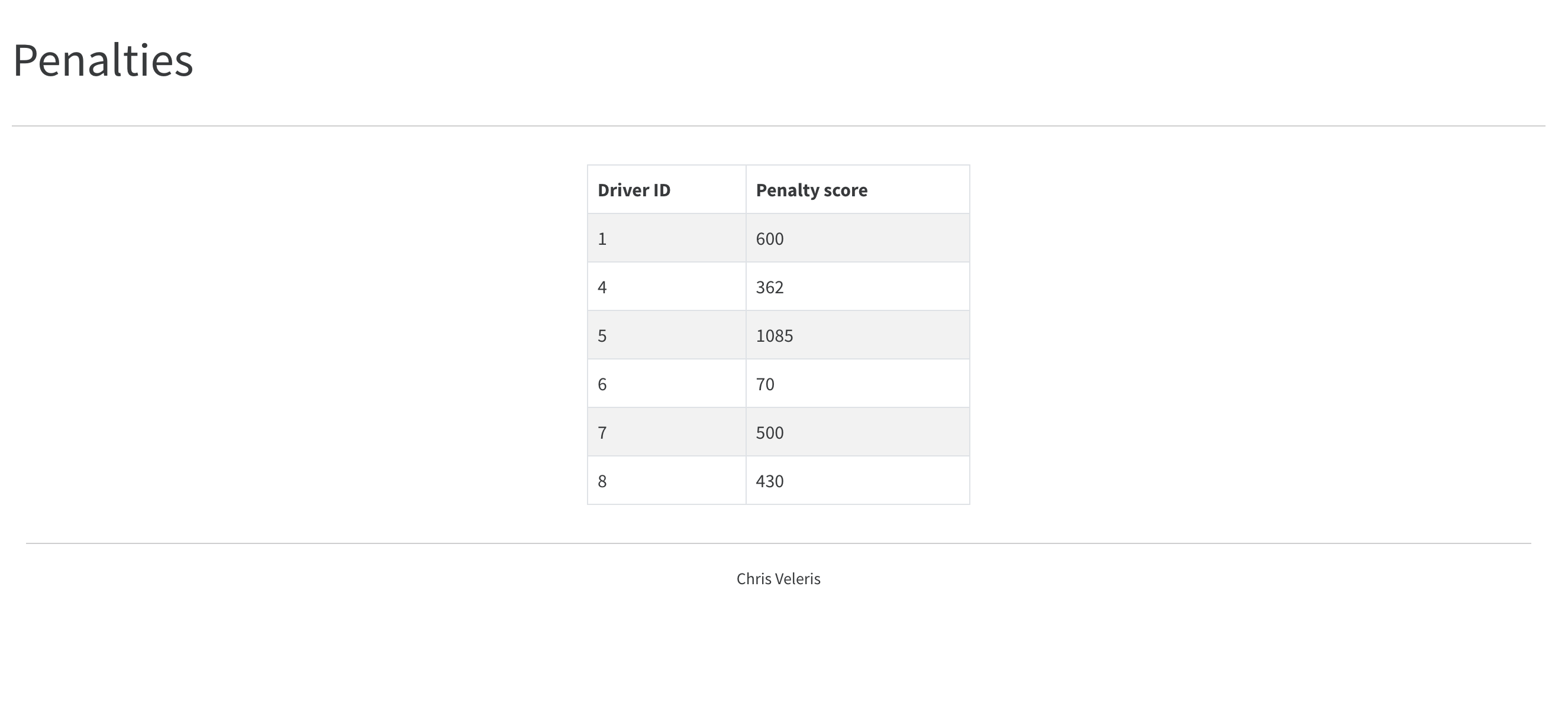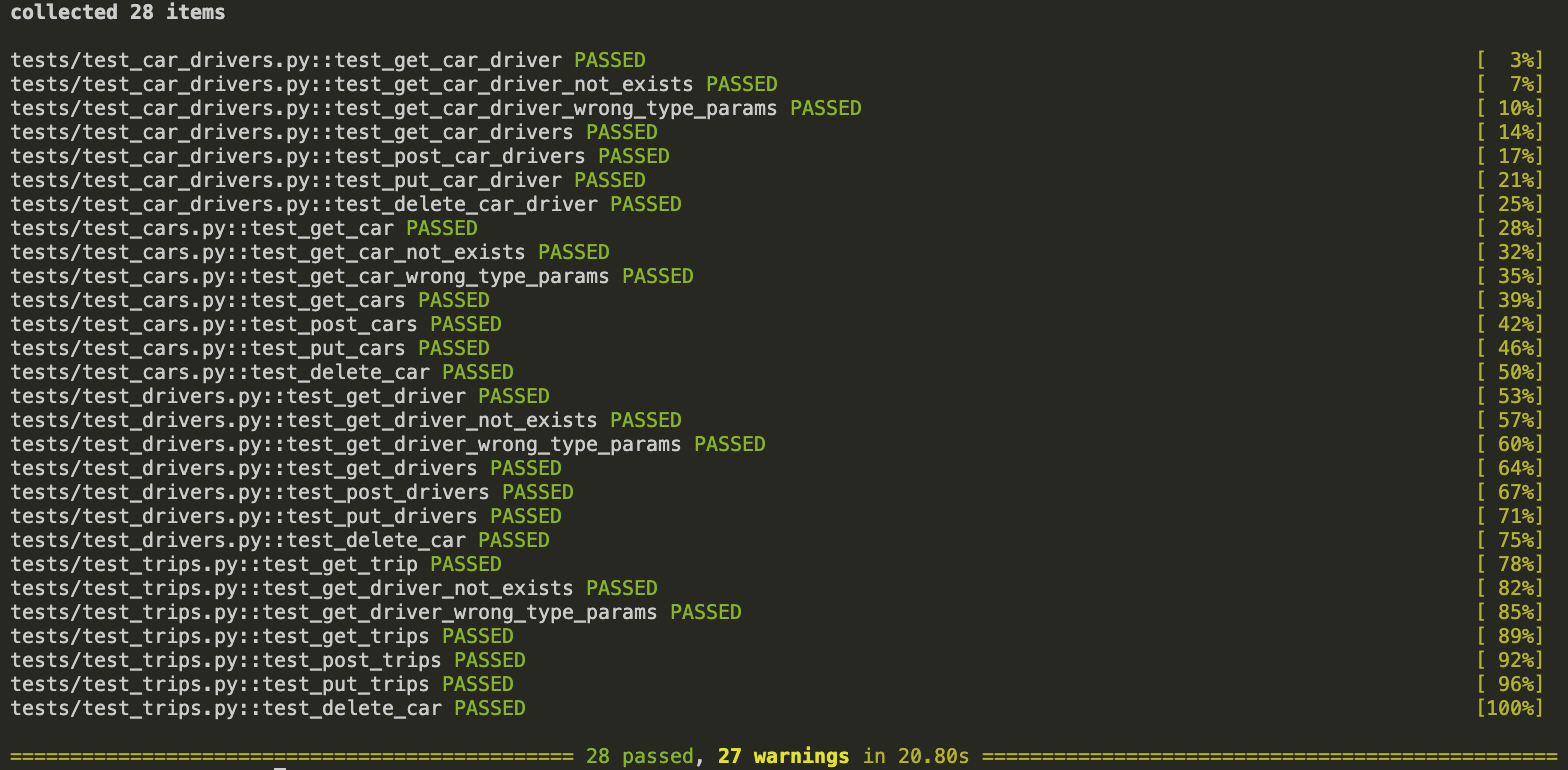- Introduction
- Architecture & features
- Screenshots
- Challenges
- Future improvements
- Installation
- Apache Kafka setup
- Testing
- Part 2 - Open Policy Agent (OPA)
- Simple OPA Implementation
Part A: Develop 3 microservices (using Python) for a fictitious Fleet Management System (FMS)
Part B: Extend FMS with OPA (Open Policy Agent)
- DOCKER: The stack includes four containers
- Microservice A (MSA): HTTP API CRUD
- Python packages:
- Flask
- Flask_RESTful
- kafka_python
- The service uses lists initialized in
data.pyas a storage solution
- Python packages:
- Microservice B (MSB): Driving simulation
- Python packages:
- kafka_python
- Python packages:
- Microservice C (MSC): Penalty assignment
- Python packages:
- Flask
- Flask_RESTful
- kafka_python
- tinydb
- Car <=> Driver penalty records NoSQL storage: TinyDB
- Python packages:
- Apache Kafka: Main messaging service bus
- Single cluster
- No grouping used
- One topic per entity, including the action (created/updated/deleted)
- A topic produced by MSB sending simulated driving states in order to be consumed by MSC and calculate penalties
- Zookeeper
- Microservice A (MSA): HTTP API CRUD
- DATA PREPOPULATOR: A topics creator and fixtures seed prepopulator is also included:
prepopulate_data.py. The prepopulator:- Cleans up the TinyDB of stored penalties
- Creates Kafka topics
- Creates fake data for all entities
- Python packages
- Faker
- faker_vehicle
- TESTS: There is also partial test coverage included
- Topics
- cars
- drivers
- trips
- car_drivers
- car_states
- [FIXED] Kafka takes about 20 seconds to spin up. There is no health check in the beginning of each of the microservices, so as they create threads and try to consume/produce, they hang. A workroung was to add a
time.sleep(20)before - [FIXED] Slow/Buffered
print()with python threads library https://stackoverflow.com/questions/18234469/python-multithreaded-print-statements-delayed-until-all-threads-complete-executi - [FIXED] Mocking
KafkaProducer.sendin tests
- Add timestamp to messages
- Improve logging
- Add arguments for specific topics and actions to
prepopulate_data.py - Setup Kafka replication, groupID, cluster
- Add keys to Kafka messages for partitioning
- Params validation
- Move topics creation from
prepopulatortokafka_python - Replace all id's with uuid's
- Better test coverage
git clone <repo>
docker-compose build
docker-compose up
python prepopulate_data.py
To run tests, execute in the root directory of each service:
pytest -v --disable-warnings # in order to disable deprecation warnings
The commands listed below are just mentioned as a reference and also for quick debugging of issues. There is no reason to run them separately.
docker-compose exec kafka kafka-topics.sh --bootstrap-server localhost:9092 --list
! WARNING: This happens automatically by running the prepopulate_data.py script once !
docker-compose exec kafka kafka-topics.sh --create --bootstrap-server localhost:9092 --replication-factor 1 --partitions 3 --topic drivers
docker-compose exec kafka kafka-topics.sh --create --bootstrap-server localhost:9092 --replication-factor 1 --partitions 3 --topic cars
docker-compose exec kafka kafka-topics.sh --create --bootstrap-server localhost:9092 --replication-factor 1 --partitions 3 --topic trips
docker-compose exec kafka kafka-topics.sh --create --bootstrap-server localhost:9092 --replication-factor 1 --partitions 3 --topic car_drivers
docker-compose exec kafka kafka-topics.sh --create --bootstrap-server localhost:9092 --replication-factor 1 --partitions 3 --topic car_states
docker-compose exec kafka kafka-console-producer.sh --topic drivers --bootstrap-server localhost:9092
docker-compose exec kafka kafka-console-consumer.sh --topic drivers --from-beginning --bootstrap-server localhost:9092
- https://www.linkedin.com/pulse/local-kafka-setup-using-docker-sandeep-khurana/
- https://github.com/bitnami/bitnami-docker-kafka
- curl http://127.0.0.1:5000/drivers
- curl http://127.0.0.1:5000/drivers/1
- curl -X POST http://127.0.0.1:5000/drivers -d "name=Michael Jackson"
- curl -X PUT http://127.0.0.1:5000/drivers/1 -d "name=Frank Sinatra"
- curl -X DELETE http://127.0.0.1:5000/drivers/1
- curl http://127.0.0.1:5000/cars
- curl http://127.0.0.1:5000/cars/1
- curl -X POST http://127.0.0.1:5000/cars -d "model=2019 Suzuki Swift"
- curl -X PUT http://127.0.0.1:5000/cars/1 -d "model=2047 Suzuki Swift"
- curl -X DELETE http://127.0.0.1:5000/cars/1
- curl http://127.0.0.1:5000/trips
- curl http://127.0.0.1:5000/trips/1
- curl -X POST http://127.0.0.1:5000/trips -d "from_location=Iowa&to_location=Texas"
- curl -X PUT http://127.0.0.1:5000/trips/1 -d "from_location=Athens&to_location=Patra"
- curl -X DELETE http://127.0.0.1:5000/trips/1
- curl http://127.0.0.1:5000/car_drivers
- curl http://127.0.0.1:5000/car_drivers/1
- curl -X POST http://127.0.0.1:5000/car_drivers -d "car_id=1234&driver_id=5678"
- curl -X PUT http://127.0.0.1:5000/car_drivers/1 -d "car_id=4321&driver_id=8765"
- curl -X DELETE http://127.0.0.1:5000/car_drivers/1
Once the containers are up, an HTML page with a bootstrap table is visible in http://localhost:5001/penalties. The page reflects the NoSQL data and does not auto-refresh.
- HTTP REST API Role-based Access Control
- All users can view (GET) their driver records
- User Bob is an superadmin and has GET/POST/PUT/DELETE acccess to drivers, cars, trips and driver-to-car assignement records
- User John is a simple member (driver) and has access to view (GET) his records or update them (PUT) but not to remove them (DELETE).
- User Kate is a fleet manager and can manage (PUT/DELETE) car records
- Defy and Enforce an authorization policy over Apache Kafka topics (1)
- Restrict consumer access to topics containing Sensitive Information (e.g. the car state containing the exact geo point and the speed of the car)
The OPA ecosystem has lots of integrations to offer (2).
- Centralized, language-agnostic authorization. OPA defies the need to multiply an already complex area.
- Makes easy to mitigate security incidents by enforcing changes quickly across the entire stack
- Real world policies can be encoded in a natural, easy to read language. This is very important because of the wide stakeholder range that are responsible for writing, editing and reviewing policies: software engineers, security engineers, ops, compliance managers, product owners. The list is endless.
- HTTP REST API Role-based Access Control: The OPA can reside in the MSA system as a sidecar.
- Kafka authorization policy enforcer docker-compose can spin up an OPA container and connect to Kafka via SSL.
!! The OPA implementation has been pushed to the
feature/opabranch. There's also a Pull Request with the changes !!
In order to experiment with OPA, a container has been added to docker-compose.yml:
opa:
hostname: opa
image: openpolicyagent/opa:0.32.1
ports:
- 8181:8181
command: "run --server --watch /policies"
volumes:
- ./policies:/policies
and a policy in ./policies/cars.rego.
The service is available at http://localhost:8181
In order to verify the policy:
allow {
input.method = "GET"
input.path = ["cars"]
has_role("car_admin")
}
employees = {
"alice": {"roles": {"manager", "car_admin"}},
"james": {"roles": {"manager"}},
"kelly": {"roles": {"car_admin"}},
}
we make some requests:
- GET request to
/cars(curl http://localhost:5000/cars):
{
"message": "You don't have the permission to access the requested resource. It is either read-protected or not readable by the server."
}
OPA docker console displays as:
opa_1 | {"client_addr":"192.168.0.5:33806","level":"info","msg":"Received request.","req_id":1,"req_method":"POST","req_path":"/","time":"2021-09-27T20:54:39Z"}
msa_1 | [2021-09-27 20:54:39,391] DEBUG in main: OPA result: False
- GET request to
/carsas alice (curl http://localhost:5000/cars -H 'Authorization: alice'):
[
{
"id": "1",
"model": "Toyota Corolla E12"
},
{
"id": "2",
"model": "Honda Civic 2019"
},
{
"id": "3",
"model": "Nissan Navaro GT"
}
]
